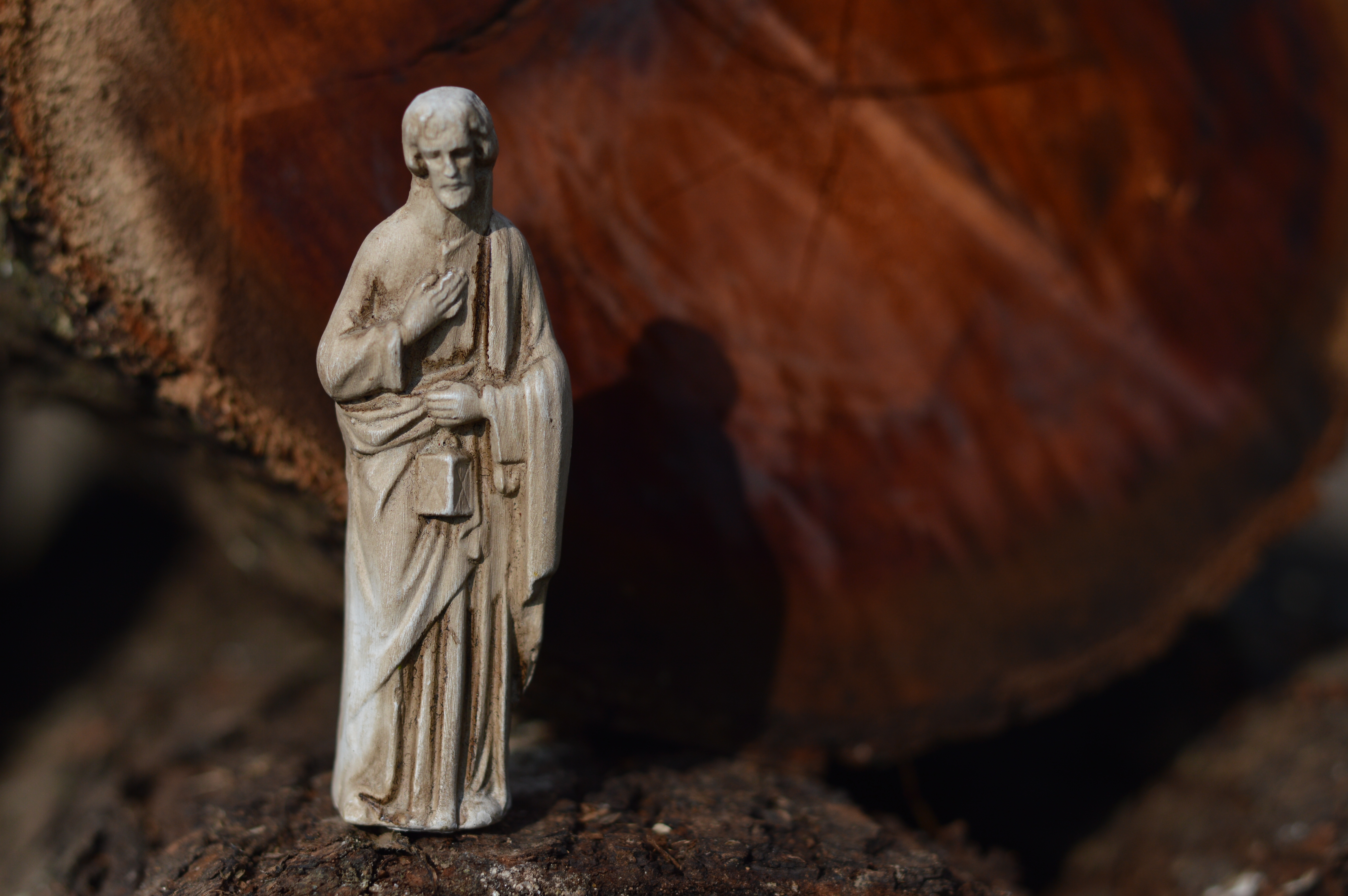*** This reflection was reposted from Diocesan Archives. ***
As we continue to hear of the difficult questions posed to Jesus, we come to the Great Commandment: “You shall love the Lord, your God, with all your heart, with all your soul, and with all your mind” (Matt 22:37). The second, also essential, follows close behind: “you shall love your neighbor as yourself” (Matt 22:39). Often, we focus more on one or the other of these commandments. After all, worship and charity seem to be quite different. It’s easy to miss the unifying connection between these two commandments: charity.
Both commandments, touching God and neighbor, are encompassed by this virtue. Just as the Great Commandment takes primacy in Jesus’ response, so does love of God take primacy in the virtue of charity. Even love of neighbor, while seemingly centered on our brothers and sisters, is ultimately done for love of God. When we love God with all our heart, soul, and mind, we love all people for his sake, recognizing that the Lord wants his creation to flourish.
Our readings give us a sort of blueprint for this understanding of charity. Our reading from Exodus gives us a foundation: charity cannot exist in us without justice. Justice, at its core, means giving the other person what is due to him. We must treat all people as they deserve, created in God’s image and likeness.
Once we learn to be just, as even the pagans were, we turn our thoughts to God. The Psalmist expresses this beautifully, proclaiming God as his strength, rock, fortress, and deliverer. “The LORD lives and blessed be my rock! Extolled be God my savior” (Ps 18:47). We proclaim in reply, “I love you, Lord, my strength.” All charity begins with the love of God. As Love himself, the Lord is the perfect object of our love. This is why love of God is the Great Commandment.
Saint Paul shows us the flowering of charity in our second reading. Having practiced justice and the love of God, we can perfect our love of neighbor. The Thessalonians impress Paul precisely in showing this charity. They cared so deeply for their brothers and sisters that they could not bear to see them deprived of the grace of God. Their evangelization was an act of love for neighbor, but it was done out of love for God. This unity of the commandments is exactly what charity calls for. We practice justice, love God in himself, and love God in our neighbor, all at the same time.
Often, we hear Gospel passages such as this one and remain at the surface. It is fairly easy to imagine what Jesus means when he tells us to love God and to love our neighbor. However, when we read in context and look for the depth of God’s Word, we can see the riches of a life of charity, lived in union with God and in communion with our neighbors.
Mientras seguimos escuchando las difíciles preguntas que se le hicieron a Jesús, llegamos al Gran Mandamiento: “Amarás al Señor, tu Dios, con todo tu corazón, con toda tu alma y con toda tu mente” (Mateo 22,37). El segundo, que es también esencial, sigue: “Amarás a tu prójimo como a ti mismo” (Mt 22,39). A menudo, nos enfocamos más en uno que el otro de estos mandamientos. A fin de cuentas, la adoración y la caridad parecen ser muy diferentes. Es fácil pasar por alto la conexión unificadora entre estos dos mandamientos: la caridad.
Ambos mandamientos, relacionados a Dios y al prójimo, están comprendidos en esta virtud. Así como el Gran Mandamiento tiene primacía en la respuesta de Jesús, también el amor de Dios tiene primacía en la virtud de la caridad. Incluso el amor al prójimo, aunque aparentemente centrado en nuestros hermanos y hermanas, en última instancia se hace por amor a Dios. Cuando amamos a Dios con todo el corazón, alma y mente, amamos a todas las personas por Él, reconociendo que el Señor quiere que su creación florezca.
Las lecturas nos dan una especie de modelo para comprender mejor la caridad. La lectura del Éxodo nos da un fundamento: la caridad no puede existir dentro de nosotros sin la justicia. Justicia, en esencia, significa dar a la otra persona lo que le corresponde. Debemos tratar a todas las personas como se merecen, creadas a imagen y semejanza de Dios.
Una vez que aprendemos a ser justos, como lo eran incluso los paganos, volvemos nuestros pensamientos a Dios. El salmista lo expresa bellamente, proclamando a Dios como su fuerza, roca, fortaleza y libertador. “Bendito seas, Señor, que me proteges; que tú, mi salvador, seas bendecido.” (Sal 17,47). Proclamamos en respuesta: “Tu, Señor, eres mi refugio”. Toda caridad comienza con el amor de Dios. Como Amor mismo, el Señor es el objeto perfecto de nuestro amor. Por eso el amor de Dios es el Gran Mandamiento.
San Pablo nos muestra el florecimiento de la caridad en nuestra segunda lectura. Habiendo practicado la justicia y el amor de Dios, podemos perfeccionar nuestro amor al prójimo. Los tesalonicenses impresionan a Pablo precisamente al mostrar esta caridad. Se preocupaban tanto por sus hermanos y hermanas que no podían soportar verlos privados de la gracia de Dios. Su evangelización fue un acto de amor al prójimo, pero se hizo por amor a Dios. Esta unidad de los mandamientos es exactamente lo que exige la caridad. Practicamos la justicia, amamos a Dios por sí mismo y amamos a Dios en el prójimo, todo al mismo tiempo.
A menudo, escuchamos pasajes del Evangelio como este y nos quedamos en la superficie. Es bastante fácil imaginar lo que Jesús quiere decir cuando nos dice que amemos a Dios y que amemos a nuestro prójimo. Sin embargo, cuando lo leemos en el contexto correcto y buscamos la profundidad de la Palabra de Dios, podemos ver las riquezas de una vida de caridad, vivida en unión con Dios y en comunión con el prójimo.
 David Dashiell is a freelance author and editor in Nashville, Tennessee. He has a master’s degree in theology from Franciscan University, and is the editor of the anthology Ever Ancient, Ever New: Why Younger Generations Are Embracing Traditional Catholicism.
David Dashiell is a freelance author and editor in Nashville, Tennessee. He has a master’s degree in theology from Franciscan University, and is the editor of the anthology Ever Ancient, Ever New: Why Younger Generations Are Embracing Traditional Catholicism.
Feature Image Credit: Jonathan Dick, OSFS, unsplash.com/photos/BJlO1Jt8sdQ










